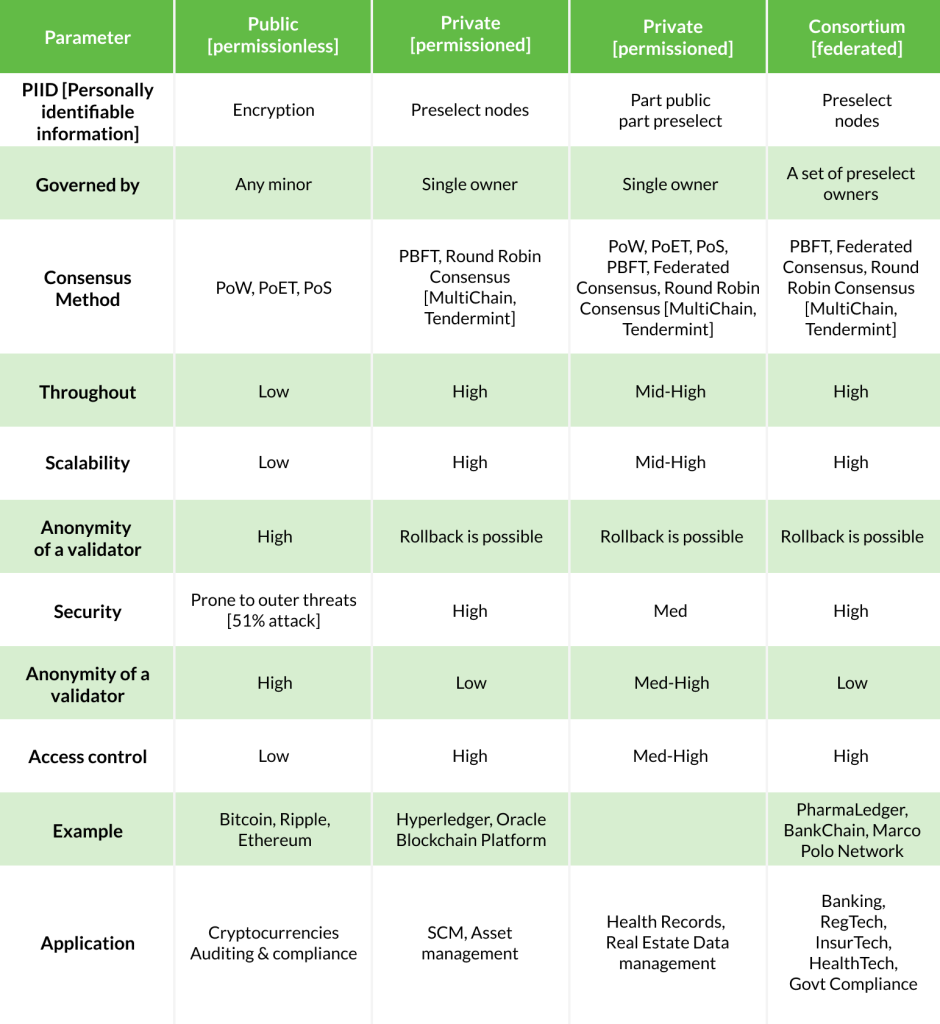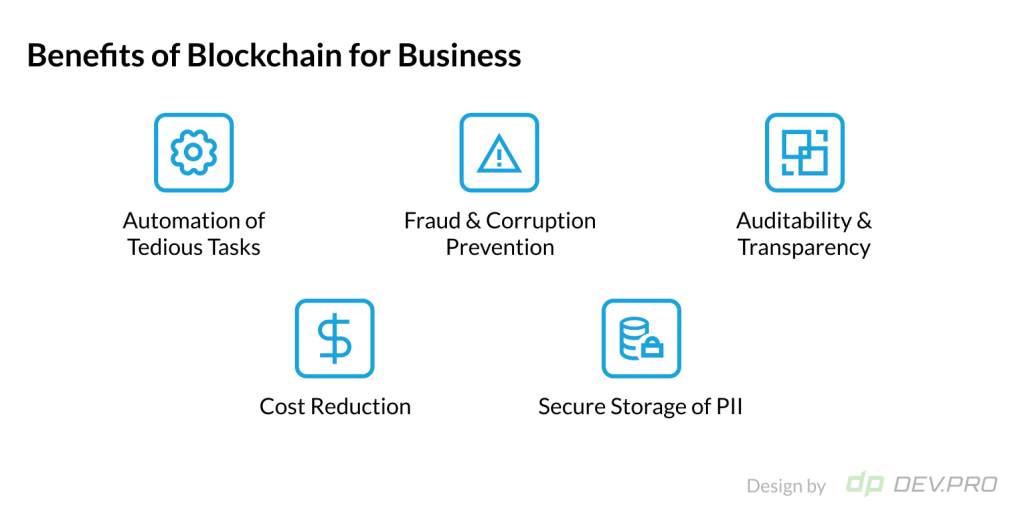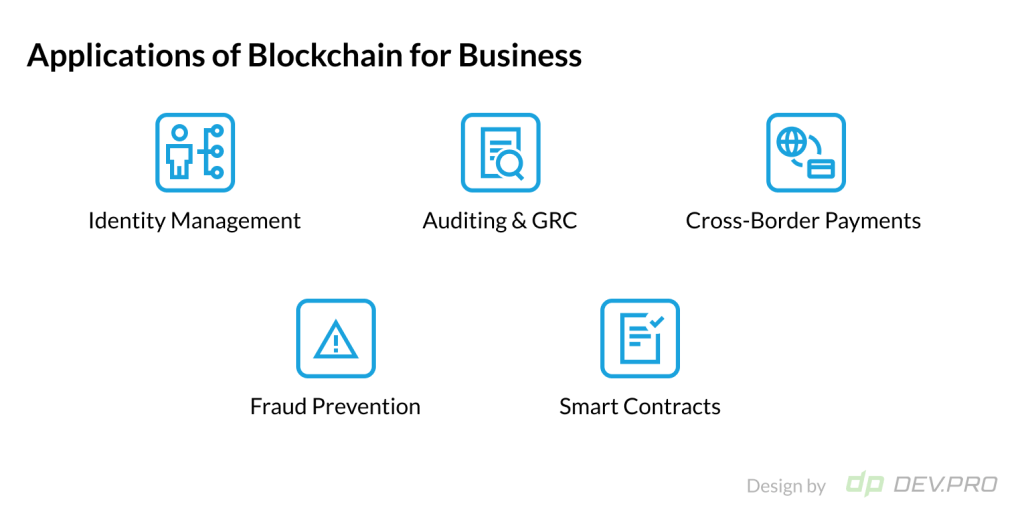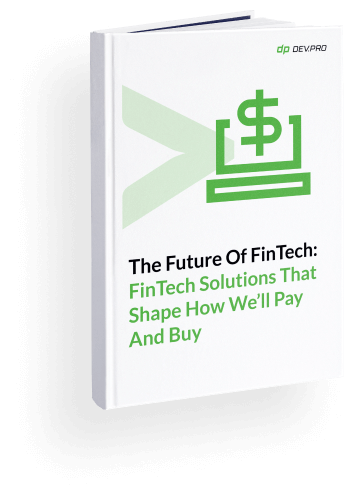Adoption of blockchain for business is still gaining momentum according to CBInsights’ 2022 The Blockchain 50 report, despite a nose dive of one of its key cryptocurrencies, Bitcoin:
- 62% of the top 50 blockchain companies are unicorns with valuations exceeding $1 billion
- The vast majority of the list are established mid-stage or late-stage businesses with 58% on Series B or C and 16% on series D+
- When it comes to the split among specific industries, infrastructure & development are leading the pack, followed by exchanges, wallet services, gaming, RegTech, PayTech, and DeFi
This analysis helps understand both the limited applications of blockchain for business as well as how the technology can be useful in several industries. The direct dependencies used in smart contracts, for example, ensure that users can only opt for this format when cause and effect are visible and minimizes intermediary conditions.
The other limiting aspect to the growth of blockchain tech is its environmental impact. This concern ensures that only critical industries that need decentralization, immutability, and traceability to gain credibility for public and authorities alike, will use the blockchain sustainably.
Dev.Pro is an enterprise blockchain development company with 5 existing projects at different scales: from a few Solidity engineers helping develop a single feature, to an extension team of 80+ staffers.
What are the Different Types of Blockchain Technology?
There are four types of blockchain technology: private, public, hybrid, and consortium.
The key difference between them is just how decentralized the network of individual nodes is. This ranges from a public network to more private ones where control mechanisms dictate who gets to partake in the consensus mechanisms.
Public chain offers the maximum degree of decentralization and credibility. It’s a permissionless network, where anyone can join and partake in Proof of Work or Proof of Stake consensus mechanisms. However, it’s vulnerable to the 51% attack, where hackers can change the ledger by amassing 51% of the network of malicious players.
Private chain is an alternative solution where nodes are controlled by an organization. Its key advantage is speed — a limited number of approved users ensures a significantly faster processing speed. This type is called a permissioned blockchain. Oracle Blockchain Platform is one of these private chains.
Hybrid chains offer the advantages of private and public environments, where part of the data can be accessed by public nodes while a designated part is available only to a select group of users.
Consortium or a federated blockchain is akin to a private chain, with the difference being that a select group of miners have access to it.
One of the biggest downsides to a public blockchain is its vulnerability to a 51% attack and slow performance. On the other hand, private chainslack the immutability and decentralization that is a key characteristic of blockchain technology. However, when it comes to enterprise blockchain development, industries with a high ratio of PII data, like healthcare and banking, have already created a number of successful blockchain consortiums.

Where Blockchain is Used: Public and Private Sectors
Blockchain technology can be used in both private and government sectors. We will cover some of the key use cases for blockchain for business later on, but the public sector has been actively discovering the benefits of this digital commodity in these domains:
- Smart cities
- Vaccine distribution & tracking
- Payroll tax collection
- Student loan observability and management
- Real Time Gross Settlement [RTGS] facilitation for central banking
Dubai, for example, takes blockchain tech seriously, relying heavily on its immutability to help make a city a place where bureaucratic chores get done safely on your smartphone.
Dubai began with its blockchain strategy back in 2018, and has continued its digital transformation with its recent Dubai Metaverse Strategy.
This directive from the crown prince of Dubai, Sheik Hamdan bin Mohammed bin Rashid Al Maktoum, sets an ambitious objective to grow the number of blockchain and metaverse companies five-fold in the next five years, attracting 40,000 new jobs.
Why Blockchain is Important for Business
There are multiple blockchain opportunities waiting for businesses that find traditional methods too slow or unreliable.
Private enterprises and governments turn to blockchain to take advantage of its core benefits:
- Secure storage and transition of data, specifically confidential sensitive data, like health records, financial data, and other PII.
- Automation of labor-intensive routine processes like auditing functions.
- Minimization of corruption, embezzlement and administrative role abuse by team members.
- Auditability and transparency, which leads to higher credibility.
- Cost reduction that arises from lower team count due to automation as well as better data handling with reduced reputational losses and legal fines.
There is a strong positive impact that comes with chain-driven decentralization. Banking institutions, for example, can lower infrastructure costs by up to 30% and save as much as $12 billion per year by using chain technology.

Best Applications of Blockchain for Business
Every industry is now trying to understand the best use of the blockchain tech for their business. The suggestions below are some universal functions that chain technology can elevate efficiency.
Identity Management
Digital identity management is becoming more of a concern as internet adoption is becoming omnipresent, and malicious actors are trying to invent new ways of obtaining PII for misuse.
The mere immutability of the blockchain transaction can become a staple in identity management, wherein personal data is stored, transferred and processed for financial verification, election process and insurance purposes.
Auditing & GRC
GRC solutions should be automated, as they involve a significant amount of repetitive tasks. Smart contracts can be the answer to these labor-intensive functions.
Adopting new ways to handle compliance will lead to significant cost savings by cutting human labor and avoiding excessive fines for noncompliance.
Cross-Border Payments
There are a lot of efficiencies and savings to be gained in this slow and expensive process . Cross-border payments take days to perform and have fees reaching as high as 10-15% of the remitted amount.
Once blockchain regulations have eased out into a globally acceptable framework, both fees and transfer time will be decreased significantly thanks to chain technology.
Fraud Prevention
Freud prevention is one of the blockchain uses for business that needs to marry this cutting edge technology with others, like AI, IoT, camera vision, big data, and ML.
Real-time monitoring, elimination of third-party approvals, and digitizing documentation all help enable a more efficient fraud prevention mechanism for critical industries like banking, real estate, and retail.
Smart Contracts
Smart contracts allow companies to automate many routine agreements that are based on simple straightforward dependencies. If A happens, then B needs to be executed.
This is why smart contracts have already made their way into InsurTech, where disbursements are paid out nearly immediately if a cause is publicly verifiable, like a plane being late or weather conditions being poor.

Now let’s check out a few companies that use blockchain.
Blockchain use Cases in Real-World Industries
Naturally, the cryptocurrency industry [alongside associated infrastructure like exchanges] is one of the major sectors that uses this technology. Other major beneficiaries include:
Healthcare
HealthTech is one of the prime beneficiaries of the confidentiality and immutability offered by blockchain technology. Uses include:
- Drug traceability & SCM for pharma [Tierion, Chronicled]
- EHR storage and management [BurstIQ, GuardTime]
- Genomics evolution [Genesy, Nebula]
- Digital Health Evidence Solutions — vaccine tracking & distribution [OnePass, IBM]
For those interested in more real life cases, check out our article on Blockchain use cases in healthcare.
FinTech
FinTech is all about offering a faster service at a lower rate — both of which are missions that DTL can help realize. These are some popular FinTech blockchain use cases:
- Trading [FTX]
- Investing & lending [DriveWealth, Fire Blocks]
- Cross-border payments [XREX, Chipper Cash]
- Fraud Protection [TRM Labs]
InsurTech
InsurTech is undeniably a match made in heaven for blockchain, as it fits the bill for straightforward smart contracts. For example, if a plane is delayed by more than 3 hours, a customer can receive a payout from the insurance company while they are still in the sky. No hassle. No intermediaries. No excessive fees or long waiting. Just cause and effect.
On the other hand, the industry as a whole can increase efficiency if it starts sharing data across the globe. Insurance comes down to math and probability, so the more data players have, the better terms they can offer to clients and the more precision businesses can enjoy.
The below are companies that use blockchain in the insurance industry:
- Claim records management [Consensys]
- Proof of insurance verification [Nationwide Insurance]
- Health Records management [Deloitte]
- Homeowners insurance management [Lemonade]
Agriculture
As the population increases, our appetite has changed toward more meat-heavy products. Most arable land has already been cultivated, leaving little room for expansion.
As it stands in 2022, humanity needs to learn how to increase crop yields while reducing water usage, fertilizers, and human labor.
These are popular uses of blockchain tech in agriculture:
- Agriculture supply chain management [AgriChain, AgriDigital, ]
- Crop insurance for farmers [Etherisk]
- Smart farming [Green Labs]
Final Thoughts on Enterprise Blockchain Development
Blockchain technology has only been used by businesses for a short period, but there are already a host of best practices in each industry. Learning these positive experiences is critical for the success of future endeavors.
The infrastructure for blockchain development is evolving by the day, with Solidity and C++ being some of the most popular languages. New frameworks and platforms have popped up to cater to the diverse needs of the corporate segment.
Whether you plan to use blockchain for small businesses or at the enterprise level, in the private or public sector, as part of the digital transformation journey or to automate a labor consuming processes, ensure you take these steps:
- Review your existing tech stack, architecture, and team.
- Review the best practices for blockchain use in your industry.
- Ascertain the gap between the first and the second iterations? and produce an RFP based on this assessment.
- Conduct investigation into the top blockchain software development companies that fit your bill in terms of portfolio, expertise, and culture.
- Choose engagement model for the project: fixed project cost, time and material, or extension team.
- Shortlist a few candidates and hold a conference call with your top candidates.
- Request a final commercial proposal based on the conversations and choose your software development partner.
Dev.Pro has extensive expertise in blockchain development. Check out our portfolio for a few examples. Ready to tie the knot with the right partner? Let our team provide you with an estimate for your project.
Quick Expert Knowledge Bites
Blockchain can be used for many business functions from digital identity management, auditing and compliance purposes, payment verifications, insurance management, to fraud protection and automating routine operational processes.
Solidity, C++, Java, Python, GoLang, Ruby, and C# are routinely used for blockchain app development. Bitcoin, Ripple, and Dogecoin use C++. Ethereum, Binance, and Stellar use GO. Solidity is used by Ethereum teams, Uniswap, and Chainlink. Solana uses Rust.


